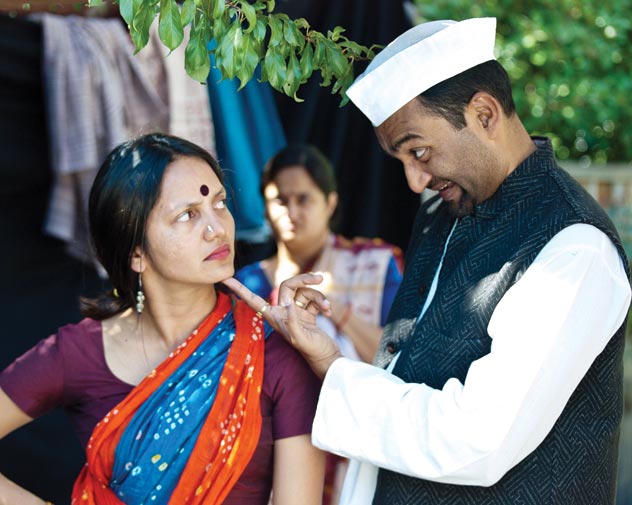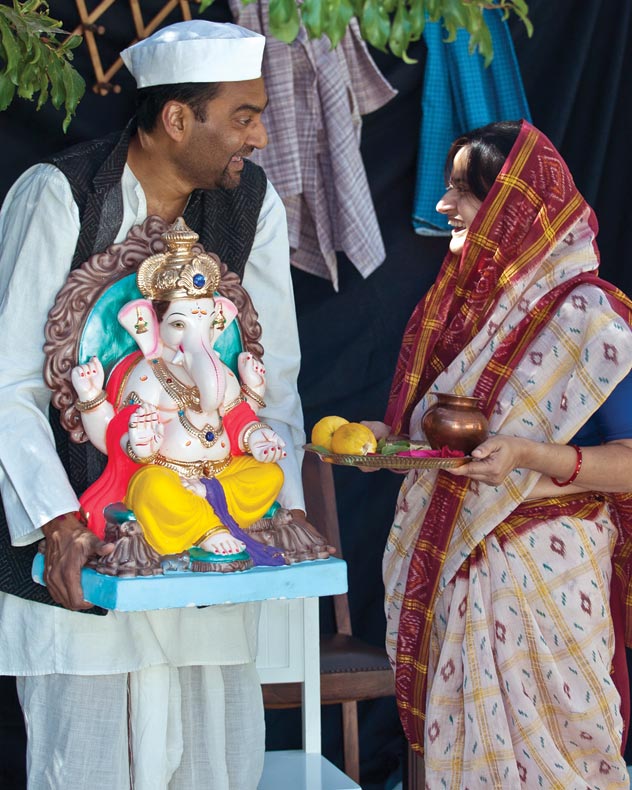THEATER
Truth Unvarnished: Vijay Tendulkar’s ‘Sakharam Binder’
‘Sakharam Binder,’ a play by Vijay Tendulkar presented by San Francisco Bay Area theater group Naatak, was controversial from the get go because it mercilessly skewered the moral hypocrisy of the Indian middle class, writes Ravi Bhatnagar.

(Above): A scene from the Naatak production of Vijay Tendulkar’s ‘Sakharam Binder.’
Vijay Tendulkar is acclaimed and celebrated as one of India’s greatest contemporary playwrights. He has been in the vanguard of not just Marathi but Indian theatre for over 50 years. Despite the disparate nature of his subjects, there is a consistency of theme and treatment in his plays, which are essentially concerned with the middle class individual set against the backdrop of a hostile society.
In all his plays, Tendulkar also displays a deep concern for women and their place in contemporary middle class Indian society, where, under the thin veneer of adulation of woman as Durga, Saraswati and Laksmi, lies a carefully orchestrated and perpetuated tradition of extreme exploitation. He prods the soft underbelly of this middle class society and exposes it for all its lies and hypocrisy.
Sakharam Binder is perhaps Tendulkar’s most intensely naturalistic play. Its protagonist, Sakharam, a book-binder by profession, who, though a Brahmin by birth, is the total antithesis of the generally accepted conception of a member of that caste. Through the delineation of this character, Tendulkar explores the manifestation of physical lust and violence in a human being. Yet he refrains from moralizing or being judgmental, and leaves his viewer or reader to come to her/his own conclusions. He portrays the basic and essential complexity of human nature, which is neither black nor white, but varying shades of grey. Thus, all the characters are a combination of good and evil, weakness and strength.
Sakharam, though apparently crude, aggressive and violent, has his own standards of personal morality. He is a man who is primarily honest and frank. This openness of his personality is in itself a sharp criticism of the hypocrisy of the middle class, whose double standards he ridicules. His straightforwardness in dealing with helpless women such as Lakshmi, and his candid declaration of his terms for sheltering them, demand a certain admiration. Yet his violent and aggressive behavior towards them exposes him as a despicable tyrant. He flaunts his virility to compensate for his inner weakness and his loneliness, only to discover its transient nature in the latter part of the play. Lakshmi, on the other hand, the embodiment of the ideal Indian woman – loyal, docile, religious, hard-working, self effacing and tender hearted – turns out to be wily and vicious when her survival is threatened by the presence of Champa. On the other hand, Champa, who is gross, sensuous and brazen on the surface, shows great kindness and magnanimity when she convinces Sakharam to give shelter to Lakshmi, who, for all she knows, may turn out to be her rival.

(Above): A scene from the Naatak production of Vijay Tendulkar’s ‘Sakharam Binder.’
Among the minor characters, Champa’s husband, Fauzdar Shinde, is an interesting character. In spite of the masochism in his character in the way he returns to Champa again and again to be beaten and abused, his friendly relationship with Lakshmi shows the inherent affinity between their characters. Just as Lakshmi is a counterfoil to Champa, so is Fauzdar Shinde to Sakharam. Dawood Mian, the only other character, is the least complex of them all. His admiration for Lakshmi and his compulsive physical attraction to Champa emphasizes the differences in the fundamental nature of these two women.
The play weaves an intricate matrix of interrelationships between its characters. Sakharam, who scorns and abhors the institution of marriage, indulges in contractual cohabitation, based on convenience, with destitute women who have either been abandoned by their husbands, or have walked out on them. He turns religious and domesticated when he is with Lakshmi. Yet, in his association with Champa he transforms into a sensuous, lewd drunkard, who is totally obsessed with sexual enjoyment. Interestingly, the simultaneous presence of Lakshmi and Champa in his life has a strange effect on Sakharam as the two different facets of his character come into direct confrontation, creating psychological turmoil and resulting in temporary impotence.
Lakshmi and Champa also demonstrate a peculiarly complex relationship. When Lakshmi returns, Champa, who is confident of her own sexual appeal, does not perceive her as a threat. Instead, it is the kindness of this otherwise hard-hearted woman that makes it possible for Lakshmi to stay in Sakharam’s house. Yet, in her treatment of Lakshmi, Champa also demonstrates an attitude of contempt – the contempt of the strong for the weak. The two women between them satisfy the different needs of the man who has sheltered them, one his carnal needs, and the other his domestic needs. Lakshmi also develops an asexual affinity with the other weakling in the play, Fauzdar Shinde, while Champa has a sexual relationship with Dawood Mian, driven by Sakharm’s impotence, which itself is caused by the presence of Lakshmi in the house when he attempts to cohabit with Champa. Complex indeed! Though Lakshmi finds nothing wrong with her association with Fauzdar Shinde, she is thoroughly outraged by Champa’s dalliance with Dawood and her betrayal of Sakharam. Sakharam’s masculinity is doubly hurt by his inability to satisfy Champa, and her consequent involvement with Dawood.

(Above): A scene from the Naatak production of Vijay Tendulkar’s ‘Sakharam Binder.’
The play, Sakharam Binder, is completely realistic not only in the development of its characters and the relationships between them, but also in the depiction of the backdrop and the setting of the drama. The action takes place in an economically backward home in a mofussil town in India. While Tendulkar probably intends it as a mofussil town in interior Maharashtra, it could, for that matter, be any place in lower middle class India.
When the play was first performed in 1974, it was banned by the Government of Maharashtra. The Bombay High Court, however, in a vindication of the right of free expression, struck down the ban. Since then, it has been translated from the original Marathi into several other Indian languages as well as into English, and has been performed thousands of times by hundreds of theatre groups all over the world.
One of the reasons for such a reaction against Sakharam Binder was its intense naturalism. Here was a raw chunk of life with all its crudity, which shocked the sensibilities of a supposedly refined and prudishly moralistic society. Yet, there is in this play also a subtle underlying tone of sensitivity and tenderness. In spite of the crudity, the violence, and outrageous behavior and attitudes, one can discern the seeds of basic human values. In Sakharam’s playing of his mridanga and the joy he derives from it, in Laksmi’s empathy with birds and insects, in Champa’s generosity towards Laksmi, in Lakshmi’s devotion to Sakharam, and in Dawood’s loyalty to his friend till he gets lured by Champa’s sensuality, one also sees the kinder aspects of the characters whose negativity is more in focus.
Sakharam Binder is the 34th production of Naatak, the foremost community theatre group in the San Francisco Bay Area, dedicated to the growth of Indian theatre as an artistic medium and as a forum for debate and dialogue on socially relevant issues.
NAATAK Presents:
Sakharam Binder – A Play by Vijay Tendulkar
October 10,15,16 – Cubberly Auditorium, Palo Alto, Calif.
October 23,24 – Front Row Theater, San Ramon, Calif.
Director: Ravi Bhatnagar
Producer: Asheesh Divetia
Cast: Rajiv Nema, Monica Mehta Chitkara, Palak Joshi, Abhay Paranjape, Aditya Thakur
www.naatak.com
|